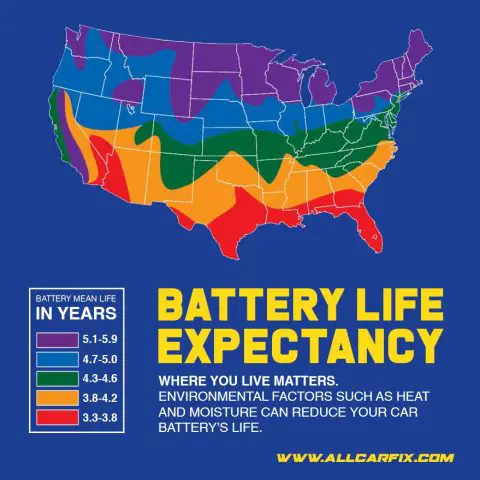
We all know how frustrating it can be when your cars won’t start because of faulty batteries. If you want to avoid having these problems altogether and keep your car running smoothly for years to come, there are some important things that all drivers should know to determine how long do car batteries last.
And so without further ado, let’s get into what makes a good battery great and what might cause one to go bad over time. Because no matter where they live or how much money they make, everyone wants their vehicle to reliably start every day.
How long do car batteries last
On average, a car battery will last for about three years. However, some factors can shorten its life to as little as 18 months, and other factors can extend the life of your battery up to five or six years.
The answer depends on a variety of things including:
The climate where you live and whether or not your car stays in an enclosed space (garage).
How frequently do you drive your car.
Whether or not you drive in stop-and-go traffic where the alternator does not have a chance to charge the battery, even when the car’s engine is running.
The make, model, and year of your vehicle.
What type of battery do you have.
If your battery is more than three years old.
Car battery life expectancy differs per region
Did you know that the average life of an automobile battery differs per region?

This is because the climate in which you drive can affect the life of your car battery. For example, it is estimated that drivers in North Dakota experience a 6-year average life for their automobile battery compared to those driving in Texas who has a 3-year average life expectancy.
Other states where drivers enjoy longer than average car battery lives are Montana, Wisconsin, Washington, and Maine. Even though most people think that cold weather is the biggest factor in shortening battery life, it is just one of the factors of car battery life.
Cold weather simply has an impact on how often you need to replace your car’s battery. Because when temperatures drop, the frequency of your engine turning on and off increases.
This puts more drain on the battery and it loses charge faster.
According to a Nationwide survey, the top five reasons people change their car batteries are:
1. Leaking acid from corrosion eats through the case of battery
2. Battery will not take or hold a charge
3. battery drains when the car is off or sitting for a long period
4. Engine turns over but the battery does not have enough power to start the car
5. A “dead” battery is found after driving to work one day
How does extreme temperature affect your car battery?
Although the map above suggests that car batteries in colder have higher life expectancies, extreme cold might have the opposite effect.
During winter, cars are often left unused and parked outside making them more susceptible to the elements. Such as extreme cold, which may cause a car battery to lose charge faster, potentially shortening its life.
During summer, many people drive more and use their air conditioning more, which can also shorten the life of a car battery.
So, the weather is only one of the factors to consider when determining your car battery’s life. And both extreme cold and heat can shorten its lifespan.
How long does a car battery last without driving
If your car has been sitting for an extended period, it is a good idea to check the battery’s water level. Without the charge from an alternator, the battery slowly discharges through the engine’s electrical circuits and other electronic components, just as it does when you’re driving.
Fully charged batteries take an average of 2-3 months for it to completely lose power. You should plan on charging your battery every month or two. Especially if it hasn’t been used at all since the last charge.
If your car is not driven for one month or longer, prepare to recharge your battery before attempting to drive. This will prevent the possibility of battery failure, which can occur if neglected. A weak or dead car battery can cause you to get stranded.
How long does a car battery last with the radio on
If you left the car with the radio on, the battery will drain faster. If you have a leaky voltage regulator or alternator, they will also contribute to a fast depletion of your car’s battery.
You can play the radio on a car battery for four to six hours before it dies. The length of time you can listen to the radio varies depending upon how many amplifiers, subwoofers, or speakers are used. You should also consider LCD screens of stereo or navigation systems.
If you’re using a stereo system with your car’s radio, you will use more power from your battery than if it was just an AM/FM station being played. The wattage should be taken into account when calculating how long the battery will last with the radio on.
How many miles does a car battery last
Typically, a car battery will last for about 5 to 6 years and about 30,000 to 50,000 miles. While there may be some exceptions to this rule, it is on the whole a good estimate.
If you find that your battery life expectancy is significantly less than what the average person gets out of their car battery, then it might be time to have your charging system checked by a professional.
Moreover, if you’ve had an inferior battery or if your car does a lot of idling, it could be the reason for a shorter life.
How do driving habits affect car battery life?
Driving habits can also affect battery life. If you often leave lights on, or if your car is running a lot of electrical accessories, then your battery will drain faster than normal.
Also, if drive in stop-and-go traffic your battery will die more quickly. Becasuse the alternator does not have a chance to charge the battery up. Driving at higher speeds uses less power from the battery since there are fewer electrical demands requiring power.
If your car is traveling too slowly, the radiator fans may turn on and drain the battery further. Driving habits can impact how long do car batteries last.
How to check car battery life
TO check the battery of your car, you need a voltmeter and a hydrometer (for checking the electrolyte level).
First of all check with the voltmeter to see how much voltage is left in it. If the voltage reading on the metering sensor is lower than 12 volts, your battery is dead and you must replace it.
The float from the hydrometer is calibrated to read specific gravity. A common range of specific gravity used in these floats is 1.160 to 1.325. A common specific gravity reading for a fully charged battery is 1.250 to 1.280 in most climates.
How to extend the life of your car battery
Now that you know how long do car battery last, what can you do to extend its life?
Keep electrolyte levels full.
The first thing that may extend the life of your battery is to ensure that the electrolyte levels are full. If you have a sealed battery, then it may be necessary to remove the plastic fill plug and add distilled water to bring up the level in all cells.
Regularly test your battery voltage
The battery voltage should also be checked periodically to ensure it is above 12.4 volts. If you find that your battery voltage is below this level, then several things can be done to fix the problem.
It could be the alternator or possibly other problems, so should always be discussed with an expert and not immediately replaced with a new battery.
Don’t leave your car unused for long periods
Leaving your car unused with a dead battery is not good for the life of your vehicle. You should ensure that the car is started up and running regularly to keep all components in the car running properly.
Don’t idle your vehicle for long periods.
Cars require a lot of energy to operate, and if left idle for too long, will drain the battery. You should try to pull over and turn off the car if you’re going to be stopped for more than a few minutes with your engine running.
Clean your battery regularly
Cleaning your battery is also a good idea since it will help the electrical connections to be more efficient. You should use a wire brush to clean off all debris that may have collected around the terminals.
Corroded terminals can also affect the overall performance of your battery, so should be cleaned and any rusted cables replaced.
When your car’s engine isn’t running, don’t use electronic accessories
Electronic accessories take a lot of power to run, so should be turned off when the car isn’t running. Items such as navigation systems, heated seats, and even lights should not be operating when the engine isn’t running.
Get your car serviced regularly
A regular maintenance schedule should be set up for your car that includes having the battery tested. You can also take part in preventative maintenance at a car dealership, which may also include a free battery test.
Contact your local car dealership for more details on how long do car batteries last and keep your car running properly. You may want to check out our top 10 DIY basic car repair and maintenance.
